Beethoven’s 9th: Furtwängler or Karajan?
mainWelcome to the 111th work in the Slipped Disc/Idagio Beethoven Edition
Symphony No. 9 in D minor op. 125 (part 4)
(1 How Beethoven wrote it here. 2 How the world changed it here. 3 How do you choose a Ninth here.)
Two conductors hold the centre ground of the German performing tradition in Beethoven’s Ninth. Wilhelm Furtwängler was chief conductor of the Berlin Philharmonic 1922-45 and again from 1952 to 1954, often also conducting the Vienna Philharmonic. His successor Herbert von Karajan headed the Berlin Philharmonic from 1955 to 1989, a period when he dominated the Salzburg Festival and the record industry. Each left around a dozen recordings of the Ninth, some of them significant.
The pair were mortal enemies, their rivalry stoked first by Joseph Goebbels in Nazi Germany and later by the record industry. Yet they had more in common than met the casual eye. Both came from a professtional background. Furtwängler’s father was an eminent archaeologist of Ancient Greek. Karajan’s father, of Greek descent, was medical director of Salzburg’s state hospitals. Both conductors believed in the supremacy of German music and both recognised Beethoven as its apotheosis.
Furtwängler enriched himself under the Nazi regime while rejecting its ideology; Karajan joined the Nazi party twice and never repented of his involvement. Furtwängler, an intellectual by temperament, wrote extensively about the works he conducted; Karajan, a technology buff, confined himself to platitudes in press interviews. Both cultivated an aura of spiritualty, compromised in Furtwängler’s case by a hyperactive erotic life and in Karajan’s by a flagrant craving for wealth, power and empire.
This is Karajan rehearsing Beethoven’s 9th, a strictly technical exrcise.
This is Furtwängler, bestowing the might blessing of German art on the blood-stained Nazi leadership:
Furtwängler perceived this symphony as a fusion of creative freedom and religious metaphor:
‘When, in the “Ninth”, Beethoven was drawn to the word, to the human voice, this was out of a need that had its origin in the preceding movements, that means, in the purely musical realm. The theme of this last movement as such was what brought with it everything that followed, the text, the human voice, the cyclical form. This very theme of all themes, a pure invention of a musician, could not be the interpretion or explanation of a certain text. Rather, the poem appears to be an explanation of the theme. And, therefore, the added human voice should thus be seen as the natural “instrumentation” of this eternal melody.
‘How the use of this “instrument”, the appearance of the human voice as such, however, is now musically motivated, in that can be seen the genius of Beethoven in all its greatness. Another composer would just simply have started the recitative and then the choral ending. With Beethoven, who only recognizes musical necessities within his work, this develops as follows: At first, the adagio appears to be virtually extended into eternity. He could not get enough of it, as if he could not finish it. The following instrumental recitatives thereby gain a peculiar expressivity and certainty. Already here one gets the impression that one is listening to the finale of all finales… This is the musical law of elevation by repetition — within the prescribed symmetry of a whole – exercised here in a grandiose manner.’
Grandiose is not quite the word to describe Furtwängler’s interpretations of the Ninth, which varied according to time and place. The most restrained, hesitant and least Furtwängler-like recording is a Berlin Philharmonic account in London’s Queen Hall on May 1, 1937, a venue soon to be flattened by German bombs. The electricity is as high as you’d expect in a Furtwängler concert but there is little to shock and surprise. This is a diplomatic engagement, maintaining appearances as the world contemplates a second apocalypse. There is something stentorian and almost martial about Rudolf Watzke’s over-loud cry of ‘Freude!’
Watzke was the watchman again in Furtwängler’s next recording at the Berlin Philharmonie in March 1942, but by now everything had changed. The world was at war, Germany was losing and all in the hall knew that their people were committing the most horrendous crime in history. From the symphony’s opening hush there is an intimation of imminent catastrophe. Furtwängler ratchets up the tension, allowing the listener a momentary illusion of familiarity before introducing a twist of expression that throws everything into primal uncertainty. There are passages in the first movement that remains terrifying at the tenth hearing. The ‘presto’ movement conveys a sense of destiny, the third movement reaches into bottomless tragedy and the finale withholds the assurance of hope. The performance was staged around a celebration of Adolf Hitler’s 53rd birthday. Some regard it as Furtwängler’s expression of distaste at the regime. This is a devious and dissident reading of the symphony, never imitated or equalled. It ranks with the all-time indispensable recordings.
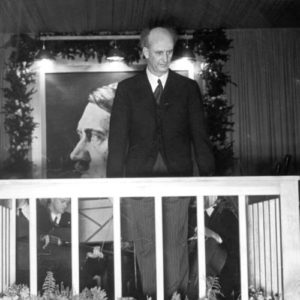
Subsequent Furtwängler performances in Stockholm (1943) and La Scala (1946) are nothing out of the ordinary, but three concerts in 1951 are epic. In January, he conducted the Vienna Philharmonic at the Musikverein, in July he re-inaugurated the Bayreuth Festival with an orchestra composed of the best musicians in Germany and in August he gave the closing performance of the Salzburg Festival. Each was a statement of his unique ability to make a work reflect the precise moment in which it is performed. The Adagio in his Bayreuth interpretation has an infusion of Wagnerian mystery, as if the composer himself had been mystically reincarnated in Furtwängler’s corporeal form.
One further recording commands attention. It is a visit of EMI’s Philharmonia Orchestra to the Lucerne Festival in August 1954 with Furtwängler and the cream of current soloists – Elisabeth Schwarzkopf (Soprano), Elsa Cavelti (Alto), Ernst Haefliger (Tenor), Otto Edelmann (Bass). Furtwängler is in phenomenal form, infuriatingly slow at the outset but raging at the opening of the finale as if to defy the heavens. Three months later he died in Baden-Baden, aged 68.
Daniel Barenboim, who played for him as a child, has written: ‘Wilhelm Furtwängler was always a stranger in this world. He was someone who went his own way and stood apart from the others: he could not be pigeonholed in any one category.’
Where Furtwängler varied in each performance, Karajan set a lifelong template in his 1947 Vienna recording with EMI’s Philharmonia recorded illegally while he was still under an Allied ban for his Nazi affiliation. Smooth, sleek almost dispassionate, his pinpoint control contrasts vividly with Furtwängler’s deliberate raggedness. One aims for inhuman perfection, the other is all-too-human. This performance is so imposing – with soloists Schwarzkopf, Elisabeth Höngen, Julius Patzak and the recital-like delicacy of Hans Hotter – that one is tempted to suggest that Karajan never bettered it. He did, however, by small incremental steps over four decades. Despite rapidly improving technlogy, for me the defining Karajan performance is the one that capped his first Beethoven cycle for Deutsche Grammophon in 1962.
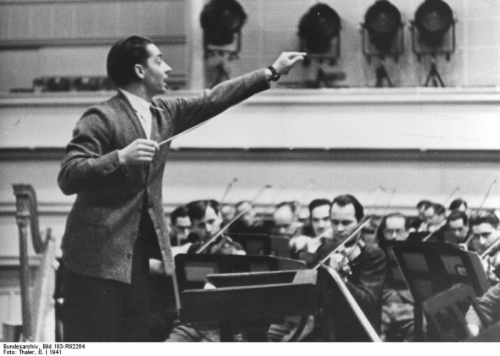
Produced by DG chief Elsa Schiller, who retired shortly afterwards, this performance was the emblem of West Germany’s post-War revival – a luxury reading of flawless magnificence, a Mercedes purring down the motorway. Joining the Berlin Philharmonic with the Vienna Opera chorus (Karajan was boss at the time of both) in the impeccable accoustic of the Jesus-Christ-Kirche, with soloists Gundula Janowitz, Hilde Rössel-Majdan, Waldemar Kmentt and Walter Berry, this was seen by Karajan himself as his signature achievement, a symphony that sold a million copies all over the world, demonstrating to culturati and novitiates alike the unsurpassable magnitude of German music. It is a summit of the art of recording, and of the imperviousness of music to moral values.

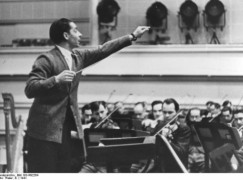
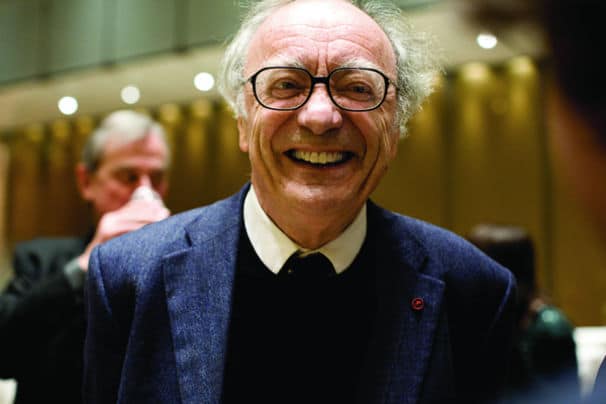

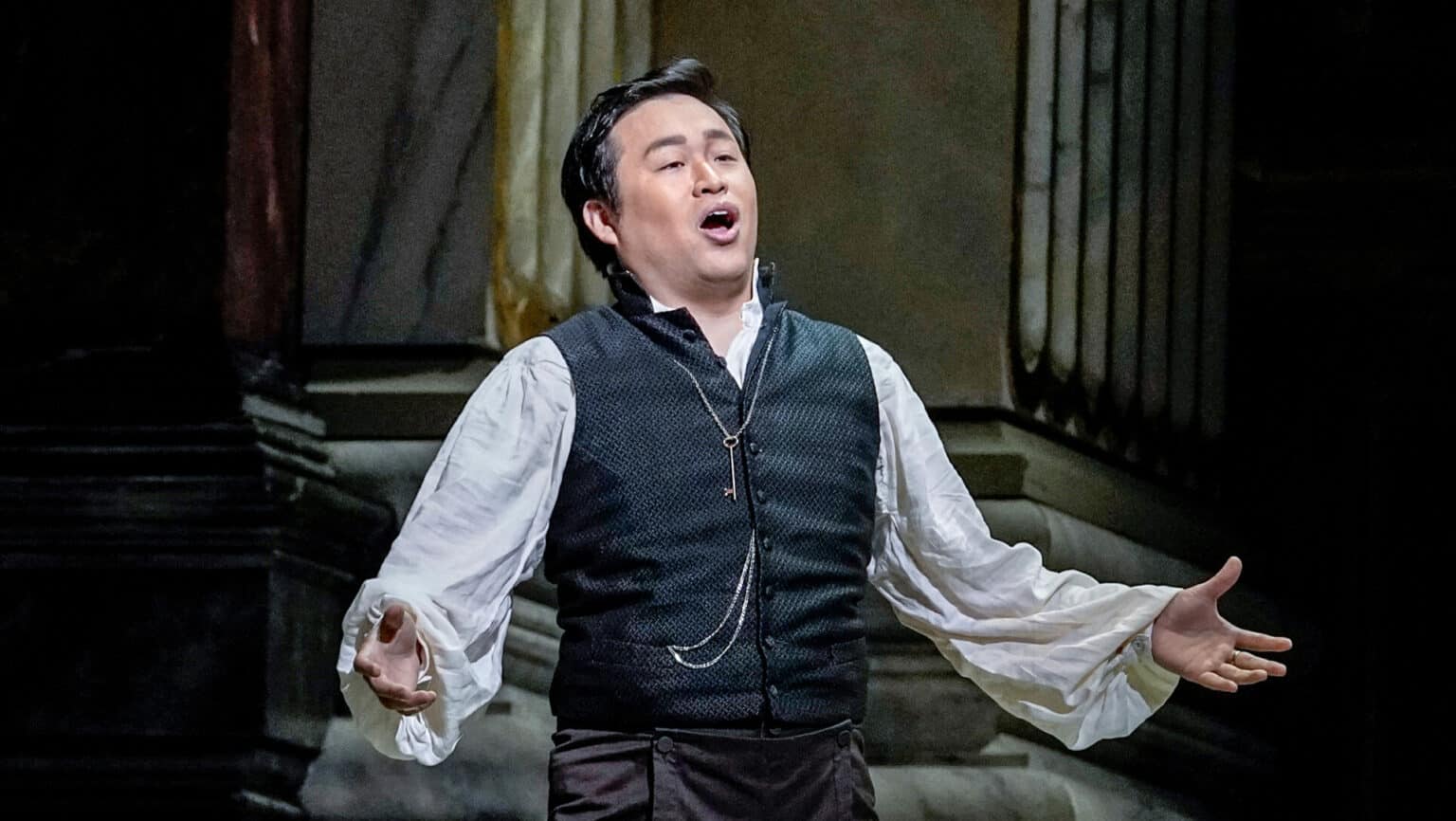

Karajan’s Greek roots often come up in commentary but they are very distant. His great-great grandfather left Kozani (then Ottoman Empire, now Greece) in 1767, first for Vienna, then for Chemnitz.
I once had a (violin section) stand partner named Balian who out of the blue one day leaned over and told me “Karajan is an Armenian name, spelled differently. Herbert von Karajan is of Armenian ancestry, I just know it.” His reasoning? Armenians are the best musicians.
The great-great grandfather’s name, Karayannis, is very Greek, and not even that uncommon. My reasoning? I am Greek and know.
Mr. Balian, I think, was pulling your leg. One of my Armenian wife’s uncles – a real kidder, he was – always claimed that Armenians were the best baseball pitchers, for the same reason.
However, my wife (surname: Kiramidjian) is a violinist who taught middle school string orchestras for nearly twenty years. Armenians may not be the “best” musicians, but there are lots of great Armenian musicians out there, past and present.
Please Mr. Lebrecht, consider making these Beethoven posts into a book!
Best wishes, Mark Ringer
+1
+ 1
+1
-1
Hearing Furtwangler conduct the 9th on record for the first time (the 3/42 performance) remains probably the most powerful music experience I’ve had outside of the concert hall.
I’m also a fan of Karajan’s Beethoven, but Furtwangler owns the piece for me.
I read somewhere that Furtwangler saved some Jewish musicians, by hiring them into his orchestra just before touring outside Germany (he was allowed to tour abroad, unlike many conductors), and then encouraging them to “get lost” and not return to Germany where they were at risk of being killed. Do you know whether this is true?
ThrownOut: The jewish members of the Berlin Phil were mostly saved under Furtwängler, as opposed to their viennese colleagues, who were wearing Swastika-armbands, even when they didn’t have to.
I can only suggest that you do more serious reading than “somewhere”. There is enough written confirmation of the lengths not only that Furtwängler went to to save Jewish people, many of whom testified at his de-nazi fication trial, but how he fought the Nazis any way he could, even after Hitler threatened to throw him into a camp. That his memory is being slandered so many decades later, by those who read something “somewhere” … is really sad.
Your version of events is disputed. WF never fought the Nazis. He exploited them to extract the highest fees in Germany.
“Nicht diese Töne!”
The more I try to think about it, the less I am able to imagine, let alone comprehend, how someone like Furtwängler would be able to conduct Beethoven in front of Hitler, ostensibly f o r Hitler, and still find any meaning in Beethoven.
How he could perform the Ninth at the height of the Nazi horrors, and not be smitten by the existential incongruity of the “Ode an die Freude” under such circumstances.
Karajan at least was the ever willing accomplice, the craftsman, the Mercedes technician who would tune the engine to perfection, no matter whether the engine was powering a race car or a bomber plane.
There is no moral dimension in Karajan.
But Furtwängler had moral pretensions.
His Beethoven hurts even more.
George Steiner’s question resonates:
How can this be?
“The edifice of total warfare and of the death-camps, of totalitarian torture and ‘the big lie’, had its base, had its contemporary triumphs, in the heart-lands of western culture. The spheres of Auschwitz-Birkenau and of the Beethoven recital, of the torture-cellar and the great library, were contiguous in space and time.”
To my dying day, which may not be very far off, I shall continue to wonder:
How can this be?
At some point in Wagner’s Das Rheingold, Wotan exclaims: “Halt, du Wilder! Nichts durch Gewalt!” – Somehow, Hitler chose to forget that line, even if it was claimed he knew every word in Wagner’s Ring by heart…
Nonsense. Bloody nonsense.
I’ll take Furtwangler every day over Karajan’s slippery-smooth-slickness. But I hope you’ll give us a part 5 in considering some of the others on your long list.
Some of us added our top 3 in another thread. Here are mine: 1) Furtwängler Berlin 1942, 2) Karajan Berlin 1962 and 3) Schmidt-Isserstedt on Decca, sharing place with the Klemperer on EMI.
For me, Furtwängler’s conception of the first movement is the most compelling, consistently, of all conductors, if one views the first movement of the Ninth as the greatest symphonic first movement in all of Western music up to that time. F is not infrequently lambasted for taking liberties with rhythm and dynamics, but one aspect he does so much better than others is to underline the climax of the entire first movement. How does he manage this, despite the mediocre sound of his recordings? I was surprised to find that for me the crucial ingredient of this climax’s visceral import, from bars 300 to 337, was to observe what was written in the score. ( I only have the old Eulenberg, so somebody with access to the Del Mar Urtext please correct me if I am wrong.) The timpani is marked ‘ff’ for the entire duration of these 37 bars, only after which a decrescendo is marked. There are also 5 ‘sf’s for the timpani from bar 327, but without any crescendos or diminuendi marked, until the decrescendo from bar 337. And this is basically what you hear with Furtwängler, quite clearly from 1942 up to and including the 1954 Lucerne Philharmonia recording– a continuous ‘tympanic roar’, albeit with varying numbers of audible sfs. So simple, yet so elemental.
Now for some indulgence in psychobiography. Beethoven’s autopsy didn’t reveal an obvious cause for his deafness, though the condition of ‘otosclerosis’ is perhaps the most common non-occupational diagnosis of progressive hearing loss from young adulthood. After Beethoven’s conducting of the premiere, was no suggestion made to alter dynamics and the like? It would surely be fatiguing for any timpanist to have to play such a long passage fortissimo, and then have another 50 minutes of the symphony to contend with. However, even if Beethoven was deaf as a post by this time, he would still have been able to feel the vibrations from timpani playing ‘ff’ if the podium wasn’t decoupled from the orchestral floor, and the player wasn’t set too far away. It doesn’t seem unreasonable to draw the conclusion that Beethoven could’ve felt the effects of such a prolonged roar, from the ground upwards, and this would have validated his conception of what this greatest of symphonic movements should feel like.
Bravo! You have nailed what I regard as an essential aspect of the first movement — that pedal point.
As a composer, WF totally understood what LvB was trying to do: the tympani is the ball and chain from which the rest of the orchestra attempts to struggle. The composer Robert Simpson, if memory serves, likened the constant dynamic shifting that occurs on 90% of other performances as Zeus politely stepping aside before hurling his next thunderbolt. Dramatically it thwarts the drama that Beethoven has so brilliantly thrust in front of us.
Ramesh: Fact is that Furtwängler was losing his hearing towards the last years of his life and couldn’t quiet hear the bass frequencies clear enough, something not often mentioned. If one sustains a quintuple fortissimo throughout the whole period in the very climax, one will not hear the F# (the third of the chord) in the basses because of all the noise. Same thing with the Storm of the Pastoral; if one doesn’t add a few fortissimo – subito menos – crescendo moltos, one will not hear the violins going up and down. It’s not about interpretation, it’s about using the ears when on the podium.
Here’s an example of how to balance the orchestral Tuttis, propably the hardest things for a conductor concerning Beethoven:
https://www.youtube.com/watch?v=4YcmIohczpQ
Incidently and as a side remark: Furtwängler and Karajan were the only conductors who never gave the Nazi Salute in public on the podium.
Pretty sure Erich Kleiber didn’t except once as a bet….
It would appear from your comments that this is what LvB wanted in performance but the score could only indicate an approximation. I agree with you.
The bass cries “ Freude” (Joy) and not “ Freunde” (Friends). This is almost like a Freudian lapsus….
Mirel: The Bass-baritone says “O Freunde, nicht diese Töne! Sondern laßt uns angenehmere anstimmen und freudenvollere!” – “O friends, not these tones! Rather let us tune our voices more pleasantly, and more joyously!”
The Freude-Ruf follows after.
Of course the Furtwangler version is great but I have a difficult time watching that room full of effing Nazis, the whole lot of them, off and on the stage, doing anything other than having their effing heads blown off. Poor Beethoven didn’t deserve to be dragged through the sewer like that.
Dave T: and yet, one couldn’t just forbid Beethoven (or any great austro-german composer) between 1933-45 because of an evil regime.
” of course the Furtwangler version is great”
Not necessarily.
It was excoriated on David Hurwitz’s youtube channel a few weeks ago, and not because of the Nazi associations.
Hurwitz is a psycho who’s run out of psychopharmaca and seems to be happy about it. Sorry. Fact is that he’s an amateur who has no clue about what he’s talking about. The comments on Amazon are way more revealing and far more intelligent.
There can be no question – Karajan, with his constant self-indulgence, doesn’t even come close to Furtwängler in the core German repertoire…
I think that Karajan was consistently better than Furtwaengler in every work that both of them recorded. Especially in Bruckner.
Even in Wagner??
Well, in opera the voices make a big difference. Furtwaengler had Kirsten Flagstad as Isolde and this detail makes his recording “the” reference (together with Karls Böhm’s Bayreuth recording who had the even greater Birgit Nilsson). In the Ring WF had Martha Mödl as Brunhilde, a very weak singer for the roll (by the way, MM was the perfect Kundry), but Karajan’s recording is perfect in orchestral clarity and balance (it was called the “Chamber Ring”), yes HvK was a better conductor in my way to listen, even in Wagner.
But what of Meistersinger, which perhaps above all other works (apart from Parsifal) reveals a conductor’s true skill? The Furtwängler recording is perhaps the finest, most emotional and lighthearted in equal quality, of any recording ever. His personality and supreme musicianship shines through, with the Bayreuth orchestra in fantastic shape, despite the undoubtedly bleak situation.
AngloDeutscher: That’s because Karajan doesn’t NEED TO come close. He had HIS OWN esthetics and imagination of sound and form. He wanted to combine Furtwängler’s flexibility with Toscanini’s precision, as he had said on more than one occasion.
Karajan’s Beethoven 9th is vastly superior to the ones I have that Furtwangler recorded. I can never quite see this Firtwangler myth when it comes to the 9th
You embarrass yourself with a comment like that. Whatever you think of Karajan as a personality, he was rarely self-indulgent.
I take both.
For me the 9th it’s Chailly and Guilini!
Try Ottmar Suitner’s interpretation on video from a performance in Japan with the Staatskapelle Berlin. An amazing performance.
Furt and Karajan are undoubtably great but what about Toscanini’s incredible months, his 1941 Buenos Aires is even more apocalyptic than Furts 42. And Mengelberg’s 1940 is wonderfully tight and we’ll sprung.
Mengelberg is such an unfairly neglected conductor – absolutely fantastic musical ideas, and such a unique style, especially with his beloved Concertgebouw!
The problem with Toscanini’s 9th is less optimal singers. Bad singers spoiled his 1952 recording that was otherwise perfect. Toscanini had excellent singers (soloists and choir as well) in his 1939 recording, but the sound quality is poor.
Furtwängler foremost but the 62 Karajan is superb. Furtwängler is the conduit of a tradition of German music from the 19th century. Karajan is the technocrat which is one reason why Furtwängler detested him so much, apart from his political affiliations.
PS – HvK was apparently no nice guy himself. So is with most great artists.
Envy was WF’s life drive, and bullying was his shelter.
Ridiculous comment. Please read his diary entries before attempting an analysis of his character and thought process.
I know none of the recordings mentioned here, except for the 1962 Karajan which I admired, even loved a lot at that time. Much later I listened to Simon Rattle’s Berlin Philharmonic opening concert while riding in my car, on the radio. It moved me to tears. The German part was there, as an essence, but completely unsentimental (If this is not a contradiction in terms) and at the same time it transcended into the universal. It felt like a kind of warm embrace of German culture only an Englishman was capable of. Was this still Beethoven? I think so, because in my perception Beethoven liked to transcend whatever it was. This was my best 9th so far. Never mind questions of musical authenticity and mastership.
Norman: You are getting lots of comments on your fine, extensive review of Beethoven’s masterpiece. Even so, I am going to throw in my two cents worth for Wilhelm Furtwängler! In particular for the 1942 performance on H****r’s b’day for which there is a film. Why is this politically highly controversial performance my choice? For a start WF had good links back to the composer and I think some of this shows thru. For example, WF uses at least two Timpani and they are loud! B was deaf and we know he felt vibrations through is body (when he died, his favourite piano was off its legs and B sat on the floor to play it). So, I think we are getting a glimpse of B trying to overcome his disability. Also, I like the performance because it is fast and lively and for once the solo singers can be heard.
The performance is also a political statement. The string section has many Jewish players and WF has successfully saved them and their families. He won this concession from Goebbels so that handshake at the end of the film version is laden. We should also remember that when the Russian Army was approaching Berlin in 1944-5, WF got ALL the players AND their families evacuated (they were going to “tour” Southern Germany). As well, the Berlin Philharmonic’s Archives and collection of historic instruments was also moved West to safety.
I suspect that many of WF’s severest armchair critics would have been less virtuous in comparable circumstances/shoes.
Exactly surely Trumps rise in the USA recently and the dynamics around Vichy France and the twenty or more years of accommodation to Italian Fascism points us to understanding better those caught up in such dynamics? Or understand the similar accommodation of artists, intellectuals, creative people to the Marxist Leninist regimes in Russia from the early 1920s, and in Eastern Europe and mainland China from the later 1940s? Hundreds of thousands of creative people were caught up, remain caught up in such situations.
A real Hobson’s choice. An auld plodder or Beethoven arranged by Mantovani. The former would be the lesser of the two evils.
I think I will stick with Gunter Wand -NDR and Wiener Akademie Haselbock
The usual intellectually-lazy clichés. As my name suggests, I am a Karajan man but this doesn’t preclude me from admiring other musician’s work. I’ve recently watched Haselbock’s 3rd and thought it was outstanding but I will still enjoy the pleasures of Karajan’s great ’62 performance. I’ve only watched Furtwängler’s 1942 performance, in not very very good sound, so I cannot judge it. (I agree with Dave T that watching the Nazis is also difficult and always make me wish for a Tarantino “Inglorious Basterds”-style ending!) However, I have a recording of his famous Bayreuth performance which is excellent. I don’t know any other conductor who can open the symphony more mysteriously. (He also has a marvellous way with the bridge between the 3rd and 4th movements of the Fifth.) Even so the Karajan 1962 recordings of the 3rd, 4th, 5th and 9th are among the greatest recordings of Beethoven ever set down. I cannot understand how anyone who listens to these performances can hear the “slippery-smooth- slickness” referred to by Peter San Diego. Just listen to the braying horns in the scherzo of the 3rd which are very close to Haselbock’s period performance version. Why does everything have to be binary these days?
“This is Karajan rehearsing Beethoven’s 9th, a strictly technical exercise.”
And yet the video link seems to contradict the put-down. Karajan focuses on the dour countenance of the chorus, trying to get them to be more joyous.
How can You mention Furtwängler and Karajan with one breath?
“How can You mention Furtwängler and Karajan with one breath?” – Easily: they created the Berlin Phil sound as we know it. Besides, HvK succeeded WF as chief.
Because they were both brilliant genius conductors of both operas and symphonies, that’s how.
And Karajan had one of the widest repertoires of ANY conductor, MUCH wider than that of Furtwangler.
Despite his “Vorsprung durch Technik” approach, none of von Carry on’s recordings have even been picked for Building a Library or Desert Island discs with Roy Plomley.
The 30 May 1953 Furtwangler is the one to have on the ICA label.
“none of von Carry on’s recordings have even been picked for Building a Library…..”
I can’t speak for Desert Island Discs but this is a blatant untruth. I don’t assiduously follow the programme but the following have all stood out or ‘won’:
Prokofiev 5, Berg Lyric Suite (string orch version), Honegger 3, Stravinsky Symphony in C, Bartok Music for Strings perc and celesta.
David Hurwitz’s youtube channel is no less authoritative on the core classics. Karajan has fared well/’won’ in the Bartok as above, Mahler 5+9 and Debussy P&M, Beethoven 9 (1970s recording)
Not the greatest conductor of the 20th century but I can’t think of one who is more important.
quite recently a Russian critic on BAL chose HK’s Tchai 6 as the best
I disagree. I think Karajan WAS the conductor of the century.
Building a Library? Desert Island recordings? Did you take such nonsense seriously?!
Most definitely!
The former was a useful, at times inspirational access to classical music before I could afford to buy recordings.
Some presenters more erudite than others of course.
I thought he always used “Wiener Singverein” chorus in everything?
Chalk and cheese.
The greatest issue with many of Furtwangler’s performances is with keeping the orchestra together and we aren’t talking a minor mistake here and there. Whole sections are a free-for-all. The primary job of the conductor is to keep everyone together. Beethoven would certainly have taken issue with this as we know from letters that he was a stickler about such things. He would most likely not approved of the wild tempo shifts that Furtwangler would insert in order to create more drama as he felt inspired either. Furtwangler’s Beethoven was special but I feel it was certainly more Furtwangler than it was Beethoven. Karajan at least kept his orchestra together and while there may be a bit too much polish I would still choose Karajan over Furtwangler for general listening, although he would still not be my first choice. It you want the old school 40’s and 50’s German tradition in more of the Furtwangler realm I would turn to Barenboim where at least you get a conductor who keeps every together whenever he feels inspired to shift gears. If you want something more akin to what Beethoven actually wrote in that classic German tradition I would turn to Jochum, Wand or even Bohm. There are many different ways to play the 9th successfully and we have dozens of fantastic recordings to choose from in this era, so I wouldn’t feel any need to limit myself to a single recording.
Brian, I’m afraid you are underrating WF now. The greatness of WF was not just “keeping the orchestra together”, his greatness is the insight he brought to the core austro-german classic-romantic repertoire, the element of controlled spontaneity, the emotionally charged performances, the mood and the breath he brings out, the enormously beautiful dark sound he brought out of the orchestras and other things his admirers might find in his interpretations. I personally love him for always giving a personal impression of a work, and not just “following the score and keeping things together”. His indescribable rendition of Mendelssohn’s Die Hebriden is a simple example of what I try to describe concerning his greatness.
Personally I choose his Berlin 42 and Lucerne 54 of all his Ninths, however, my favourite Furtwängler/Beethoven remains always the Eroica, a work that also appears on several documentations.
On the other hand, Thomas Beecham consindered Toscanini a “glorified bandmaster”, because orchestral music, as sarcastic scholars once said used to be divided in two parts, before and after Toscanini. The bad tongues said “before Toscanini, orchestras didn’t start nor end together. After Toscanini they both started and ended together.
In the biography of the conductor Günter Wand, “ So und nicht anders” by Wolfgang Seifert, there is a passage in which Wand relates his experience of attending a pre-war Furtwängler concert in Wuppertal during the 1930s. He was very impressed and inspired by the performance. A journalist asked him how he’d consider interpreting Beethoven’s ninth symphony, more like Arturo Toscanini or rather like Wilhelm Furtwängler. Wand answered laconically: “Like Beethoven”.
Now fast forward to the post-war, sometime during the 1950s, Wand attended a performance of Beethoven’s fifth conducted by Furtwängler. He was appalled and revolted by the performance, as Furtwängler had added another percussion line in the transition into the Finale together with an extra bar of music, all to add to the effect.
When Wand was appointed GMD at the Gürzenich he was horrified by the state of the Beethoven scores, which had been modified by the hands of his predecessors to a degree that he found almost sacrilegious, “I don’t just mean dynamic or agogic comments or suggestions of tempi, I mean entries that, since the days of Wagner, Mottl, Weingartner and Mahler had been provided as so-called improvements of instrumentation, for example in the symphonies of Beethoven”.
Wand thought it extraordinary that, for example, many learned articles were written about whether or not there should be a clash of cymbals at the climax of the Adagio in Bruckner’s seventh, “all well and good, but who is writing about the fact that whole stretches in Beethoven’s symphonies are being reproduced in a tonally distorted fashion, without anyone raising the tiniest squeak of protest?” Up to the very end of his life, the thought of these abuses would prompt Wand to slip into a queasy silence.
When the Gürzenich was rebuilt after the war, Wand purchased a new set of scores of Beethoven’s symphonies and orchestral parts.
I have three recordings of Beethoven’s fifth conducted by Furtwangler on the Tahra label, with the BPO, 1937, 1943 and 1954. For me, the 1937 one is the best despite the sound quality, the other ones show a marked slowing of tempi and the 1954 recording confirms Wand’s criticism of the additional percussion line and the heinous added extra bar.
Recently I have been following the Beethoven series with the Wiener Akademie, their fifth compares favourable with the celebrated Kleiber recording on DG and their ninth is also excellent. I should also say that Wand’s 1965 Missa Solemnis on Testament is a wonder to behold.
Karajan did NOT join the Nazi party twice. Can we bury that one please? Richard Osborne disproved it in his scholarly biography of Karajan. Besides when told at Aachen in 1935 that to get the job he had to join, if he already was a member he would simply have replied that he already was one. But he did not.
The Nazis issued party membership cards stamped with high starting numbers in order to give the impression they had more members! In Karajan’s case his was not validated at all as he did not pay his Sub! I would not trust Richard Osborne he is too much of a Karajan sycophant to be reliable.
The question whether Karajan joined the Nazi party more than once is irrelevant, the fact that he joined such a dubious party at all, headed by a working class Austrian, resembling Charlie Chaplin ,who could not speak German properly, speaks volumes about his lack of moral fibre. No self respecting gentleman would do so, but then Karajan was not a gentleman.
We had several German families relocate near us in Ireland after the war, including the Bielenbergs. The Bielenbergs lived on a farm near Tullow county Carlow. They knew Furtwängler quite well, but they detested the mountebank Karajan.
In her book the past is myself, Christabel Bielenberg wrote, “We came to Ireland in 1948. All our friends in Germany had been murdered by Hitler so we left. I couldn’t expect my German husband to live in England, which was still very anti-German. So we came to Ireland. My father was Irish, from Corofin, and I had always loved Ireland. I used to come here for school holidays.”
As Edmund Burke remarked, the only thing necessary for the triumph of evil is for good men to do nothing.
Why nobody mentions Karajan’s 2nd Beethoven symphonies cycle for DG from the 70s? For me, that’s the reference. Although he never respected the repeats in the scherzos. I like Chailly’s cycle as well. Haitink cycle with LSO has its moments.
It’s amazing how two music critics I greatly respect, have diametrically opposed views of Furtwängler’s 1942 Beethoven’s Ninth. David Hurwitz on why Furtwängler’s 1942 Beethoven’s Ninth Really Sucks.
https://www.youtube.com/watch?v=uBRXDrrXqLM&t=1037s
His main beef is that all the Jewish musicians had been sacked and the orchestra wasn’t that good anymore.
I enjoyed Norman’s analysis of Furtwängler’s hidden message.
Well, that’s what makes classical music so fascinating. We can all have different responses to the same performance.
David is equally dismissive about Bruno Walter’s Mahler 9 recorded in Vienna shortly befor Anschluß. Others hail its incredible atmosphere. Either way, the recorded sound lets it down. It was 1938 of course.
Tony: How can you buy what that amateur clown Hurwitz says?…Try Joachim Kaiser, Hans Keller, Neville Cardus, Alan Blyth, those were professional scholars, not pompous bloggers…
Novagerio, always good to hear someone else’s point of view. Neville Cardus was a great writer in both music and cricket. John Arlott was a great cricket writer. However, I think the composer Robert Simpson and Mahler expert Derryck Cook were people I used to like listening to. The late Antony Hopkins was a great communicator. Michael Kennedy was good on English music. Hans Keller was a great scholar as you say. H C Robbins Landon was always good to listen too.
Hurwitz makes a cogently argued, and entertaining case for his admonishment of these two classic recordings.
Toscanini was Karajan’s major influence and it shows in the conducting. From a purely musical point of view, therefore comparing WF and HvK may be somewhat redundant.
Although Karajan’ 1962 account of the Ninth is superb I have always found his Beethoven a little too “athletic”.
Furtwängler 1942 would be the performance of choice for me.
This is magnificent writing revealing the philosophical and historical complexities of a performance tradition.
My question, rather trivial in nature, is what’s the significance of the two conductors‘ family background? Mr. Lebrecht describes them as both from professional class, although I think back in the day being an archaeologist was much more a calling than a profession and many an archaeologist had aristocratic background (at one point four out of five Yale archaeology professors refused salary).
I have 11 versions by Furtwaengler, one by Karajan that i bought to hear Hans Hotter in 1947.
Eleven? I only have a mere five.
Alexander T –You’re doing well; five is enough if the right ones. My problem, among others, is that Furtwaengler is one whose entire discography I try to hold. Not necessary, but I always hope for an accident or discovery, which seldom happens. It’s over-compensating for never having heard him live, and missing him twice.
Hello Edgar,
11 versions – wow! I’d love it if you could tabulate them for us, hopefully with record labels and catalogue numbers.
I have three by WF in my collection: the famous 1942 wartime one, the famous Bayreuth one, and the famous valedictory Philharmonia one.
My preference is for the 1942. From the opening moments it grabs you by the heart and mind and guts and doesn’t let go ’til the end.
Amico, you probably have done so already, but have you heard the issue (I can’t tell you what label; I heard it on my internet radio) of the UNEDITED Bayreuth Ninth? Apparently it was the Rot-Weiss-Rot radio recording of the actual performance.
It is superior to the EMI because of the continuity of tension and release, the art of which WF was a master. Plus, the sound (as far I could ascertain from my pretty-darned-good sounding radio) seems to be excellent for its time.
EMI, of course, sliced and diced their famous issue with rehearsal takes. I remember hearing somewhere – maybe from an EMI sales rep – that the EMI-WF-Bayreuth-Ninth was one of the VERY few records to be issued in EVERY country in which EMI had a presence (think: the soon-to-be-extinct British Empire).
Keep in touch, my honorary paesan….
– G.
Another Ninth from Nazi Germany on disc, but one with less notoriety than WF’s, is Bohm’s in Dresden (1941). For those with a taste for the gruesome. (Warner Classics, re-mastered 2017).
Sorry, Greg, but because of my blindness I can’t give details of the Furtwaengler Ninths.
John Hunt’s paper-backed book “The Furtwaengler Sound” has a comoplete discography from 1926-1954 and concert and opera listing of all his known perfornances from 1906-11954. My copy is the third edition, 1990, dedicated to Frau Dr. Furtwaengler and published by the UK Wilhelm Furtwaengler Society. There is probably also a discography on line.
They include successive nights in a run with the change of one singer, &tc,
When I was in Bayreuth in August 1954 for “The Ring”, I went to the box office for tickets to his Ninth in the Margrave Opera House there, not the Festspielhaus. They just laughed at me, saying it was sold out for months, but I have the recordings and agree with you about Austrian Radio’s 1951 unedited CD. Three months later on December 7 he was buried in Heidelberg, where I still was. I never saw or heard him in life.
John Ardoin’s book “The Furtwaengler Record”, while not discussing every single issue, is informed and helpful. He and his friend maria Callas were great fans.
I gleefully accept honorary paesanship to add proudly to my Interpol wanted posters, honorary citizenships, and deportation orders. .